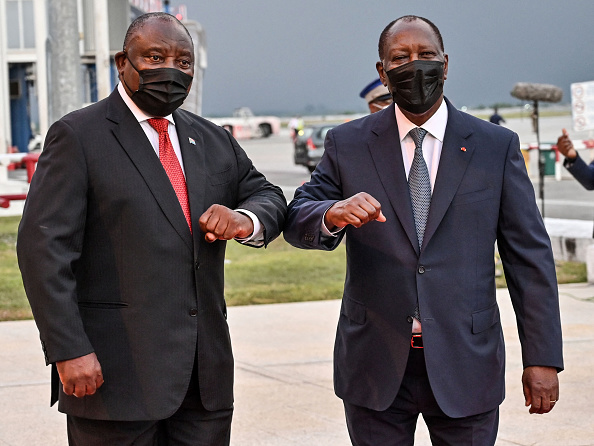Abidjan – South African President Cyril Ramaphosa on Thursday warned against the risk of “health apartheid” as he took aim at travel bans imposed on his country after it detected the new Omicron variant of Covid.
On a visit to Ivory Coast, he said the curbs, which many countries have also applied to countries across southern Africa, were “regrettable, unfair and unscientific”.
“Given that it was our own African scientists who first detected the Omicron variant, it is also a slap in the face of African excellence and expertise,” Ramaphosa said after meeting his Ivorian counterpart Alassane Ouattara.
“These bans will cause untold damage, in particular to travel and tourism industries that sustain businesses and livelihoods in South Africa and the southern African region.”
ALSO READ | ‘We need to do more to achieve further integration of our two economies,’ says Buhari as he meets Ramaphosa
He added: “As South Africa, we stand firmly against any form of health apartheid in the fight against this pandemic.”
He called for a “global guarantee” to ensure that vaccines and treatments for Covid-19 “are produced at scale and made freely and equitably available to all people.”
South African scientists announced on November 25 that they had detected a highly mutated form of coronavirus.
The variant has since been reported in many other countries, including in Europe, India and the United States. Three other African countries – Botswana, Ghana and Nigeria – have recorded cases.
Noting the restrictions that followed the announcement, Ramaphosa thanked Ouattara for showing “solidarity” by that his state visit should go ahead.
ALSO READ | WATCH | ‘We’ve had extensive discussions with President Buhari,’ says Cyril Ramaphosa
It is the first visit to Ivory Coast, the world’s biggest cocoa producer, by an African president since the two countries established relations in 1992.
Ramaphosa was a powerful mining union leader during the apartheid era, before he became a successful businessman after the end of white-minority rule.
A former deputy president, he is South Africa’s fifth head of state since the advent of democracy in 1994.
He is on a tour of West African states that has included talks in Nigeria, the country’s most populous nation.
Follow African Insider on Facebook, Twitter and Instagram
Source: AFP
Picture: Getty Images
For more African news, visit Africaninsider.com


